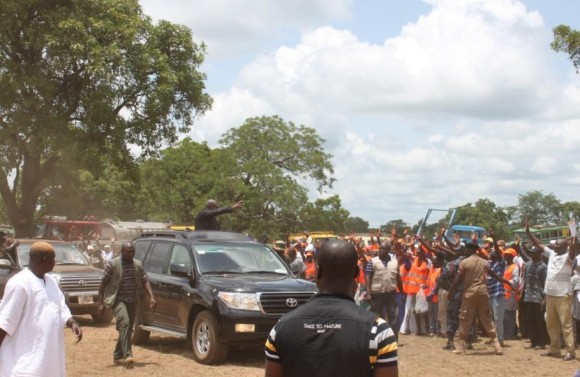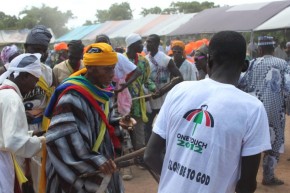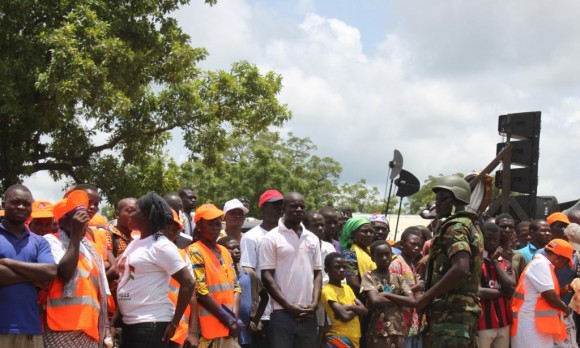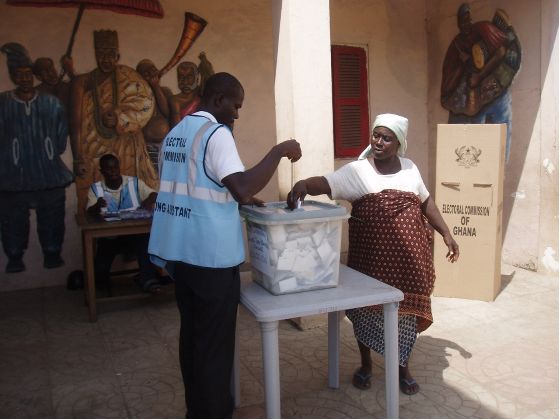Ex-President Jerry Rawlings stands in front of a baying crowd at an election rally, and bellows out to them “Protect your ballot boxes the way you would protect and defend your mother!” It’s a powerful moment from the fly-on-the-wall documentary An African Election which charts the nail-bitingly close 2008 Ghanaian election.

The statement at once demonstrates the power people invest in elections here in Ghana, in a way those of us from the UK would never normally experience, but also the heightened tensions that results from so much being at stake. Elections in Ghana are slated for 7th December this year, and as the date approaches, you can feel passions palpably increasing. I first experienced this first-hand a couple of months back when I walked around the corner in Accra straight into a cloud of tear gas being fired to disperse protesters from outside the Police Headquarters; eyes watering, coughing and spluttering I made a hasty retreat.
Back in 2008, the election was ultimately decided by only 40,000 votes; the first round of voting was too close to declare an outright winner, and as the run-off approached, the prospect of serious outbreaks of violence seemed very possible. The film dramatically charts the ebb and flow of the tension, and there’s one moment in the strong room of the Electoral Commission (where the votes are collated) where allegations of vote rigging start flying between party agents.
Ultimately the election resulted in a peaceful and democratic handover of power, and as this comment demonstrates, there is a very real and pervading sense of Ghanaian democratic pride (within the film and in Ghana more generally). Ghanaians are rightly proud to have had five successive free and fair elections and two transfers of power, and are confident the upcoming election will further embed this tradition.
 Ghana’s electoral history does indeed have a lot to offer other countries across the continent. The director of ‘An African Election’ is trying to build on this democratic tradition with a project called A Political Safari, where he is travelling across Ghana (and later several other countries in Africa) with a mobile cinema screening the film, sharing Ghana’s democratic experience and trying to reach out to people to become part of the political process.
Ghana’s electoral history does indeed have a lot to offer other countries across the continent. The director of ‘An African Election’ is trying to build on this democratic tradition with a project called A Political Safari, where he is travelling across Ghana (and later several other countries in Africa) with a mobile cinema screening the film, sharing Ghana’s democratic experience and trying to reach out to people to become part of the political process.
As part of UK aid support for the election this year, the Ghana Electoral Commission will train 276,000 party polling agents for election day duties; I spoke at one of the workshops for the agents and was impressed by the detailed discussions taking place about the rights and obligations of political parties under Ghana’s constitution. Last month, former Head of the UK Civil Service Lord Gus O’Donnell, led a series of discussions with politicians and the civil service in Ghana around the importance of transition after elections in the democratic process – again a very positive sign.
Biometric voter registration was used for the first time in Ghana this year, and UK aid provided support to monitor the process. Of course, it’s so often not in the voting but in the counting where elections fail to be democratic –so UK aid has supported all of Ghana’s key institutions – the Judiciary, the Electoral Commission, the police force, to try to ensure from registration to resolution, there is the best possible chance of another free, fair and peaceful election.

There’s also some more innovative work being done to support the Ghanaian elections. Ushahidi is a website that was started in Kenya during the violence of the 2007 election (watch a TED talk about it here.) Using reports Kenyans submitted on their mobiles or the internet, it crowdsourced the information to create a far more accurate and up-to-date picture of what was actually happening in the country than the Kenyan media did. The technology has been used everywhere from Haiti to the Middle East since, and UK aid is supporting its use here in Ghana - watch out for another post on this shortly..
As well as managing UK aid support for the election in the coming months, on election day itself several DFID and other British High Commission staff will be volunteering across all 10 regions across Ghana to act as election observers–assessing the voting process and feeding back eyewitness reports from the ground - expect more on this and other areas of our election programme in Ghana in the coming weeks.


1 comment
Comment by Tahidu Issahaku posted on
It is high time we try shift from lies to truthfulness both the international and local observers such as peace council and the rest do witness that they were some irregularities in the election 2012 yet they are all still standing that they was nothing wrong with the election. Please, the duck days will befall us one day if we pretend and say is alright some body one day will not agree that is why some leveled Ghanians are saying we should be say wrong when it is wrong. Thank you